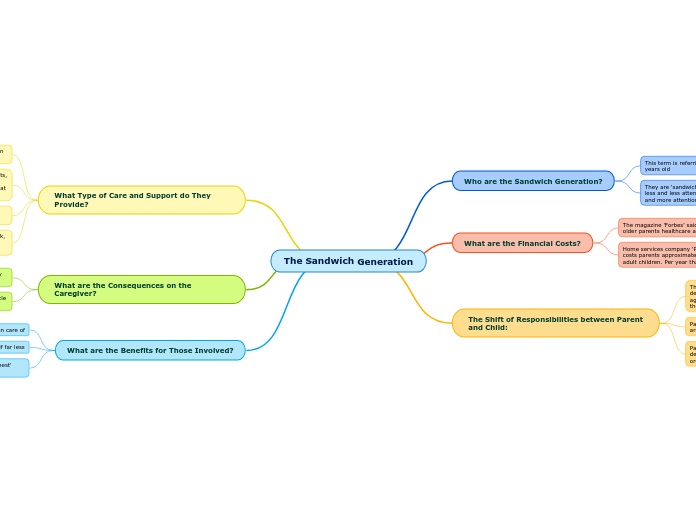The Sandwich Generation
Who are the Sandwich Generation?
This term is referring to those in middle age, around 45-64 years old
They are 'sandwiched' between their adult children who need less and less attention and their older parents who need more and more attention
What are the Financial Costs?
The magazine 'Forbes' said that the total cost of paying for older parents healthcare and daily needs is $100,000
Home services company 'Porch' did a survey showing that it costs parents approximately $459/ month to provide for their adult children. Per year that is $5,508
The Shift of Responsibilities between Parent and Child:
The shift of responsibilities going from independent to dependent can sometimes be awkward or uncomfortable, as aging grandparents may feel like they are losing control over their lives
Parents may need to care for their parents financially if they are unable to work
Parents may need to care for their parents health if it is deteriorating. Grandparents may move in with their children in order to be taken care of
What Type of Care and Support do They Provide?
Parents may support their children by helping to cover tuition fees, food, housing and transportation bills
Parents may need to care for the health of their aging parents, such as paying for/ administering medication, feeding them, changing them and doing other household responsibilities that their parents can no longer do
Parents may also need to figure out the social lives of their parents in order to keep them mentally healthy
Because their adult children may be busy with school or work, parents may take on the responsibility of doing their child's household chores
What are the Consequences on the Caregiver?
Caregivers may become physically, mentally and emotionally exhausted
The retirement savings of parents will be less, creating a cycle of dependancy on the next generation
What are the Benefits for Those Involved?
The aging parents are taken care of
The financial burden on the young adult children if far less
Keeping their family close helps parents fight 'empty-nest' syndrome
